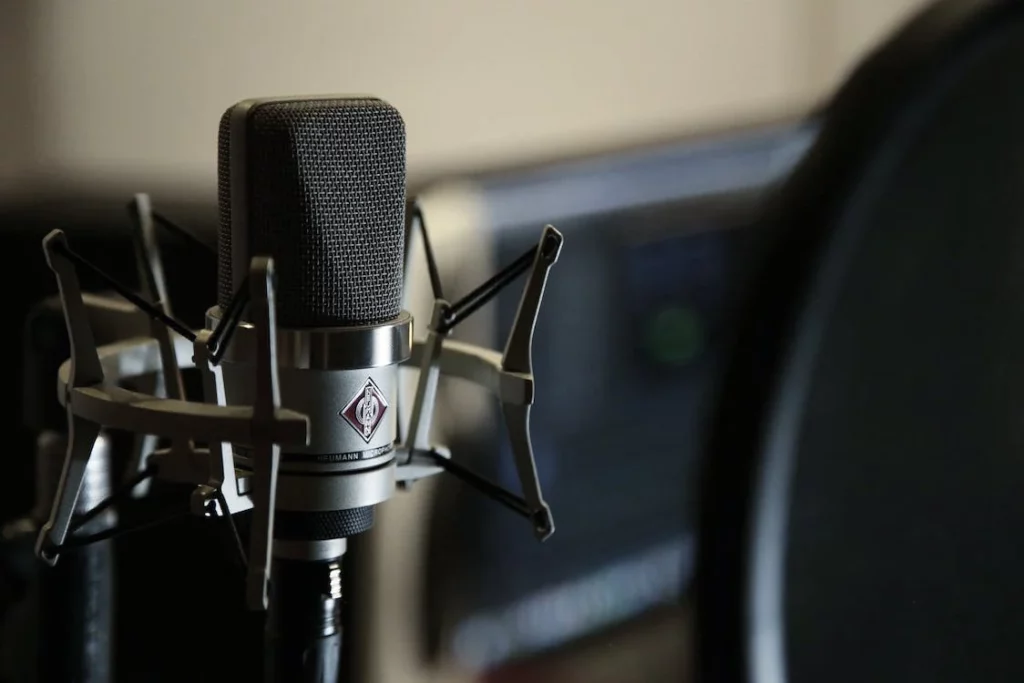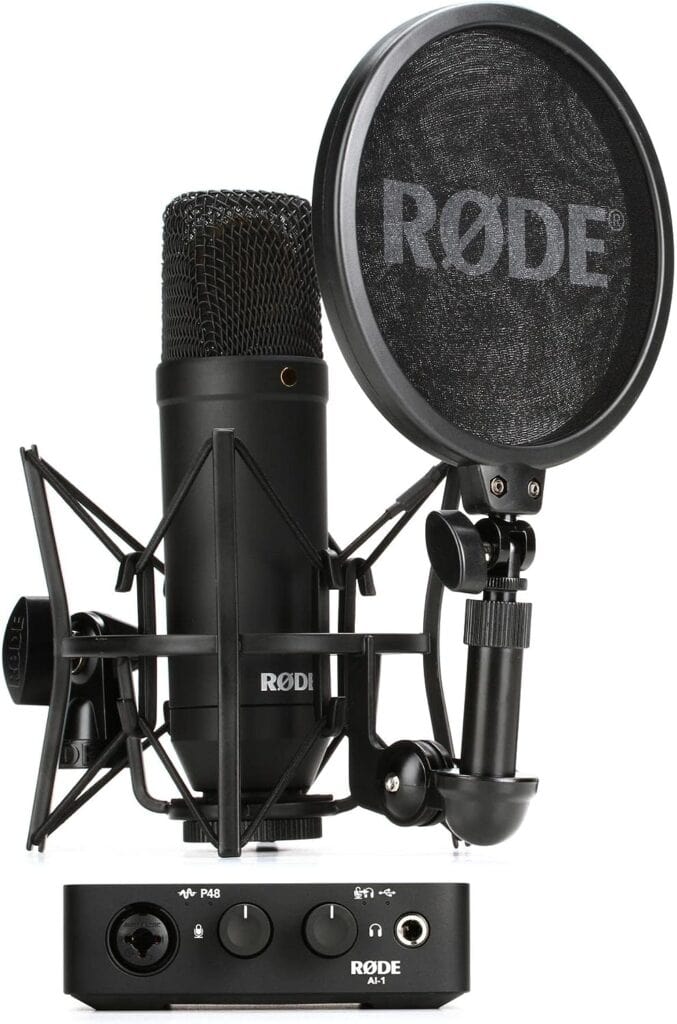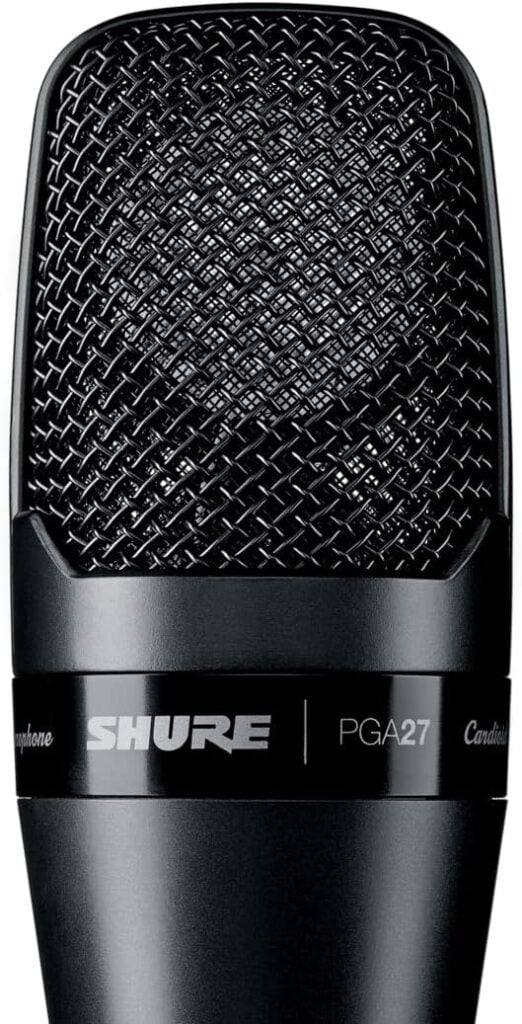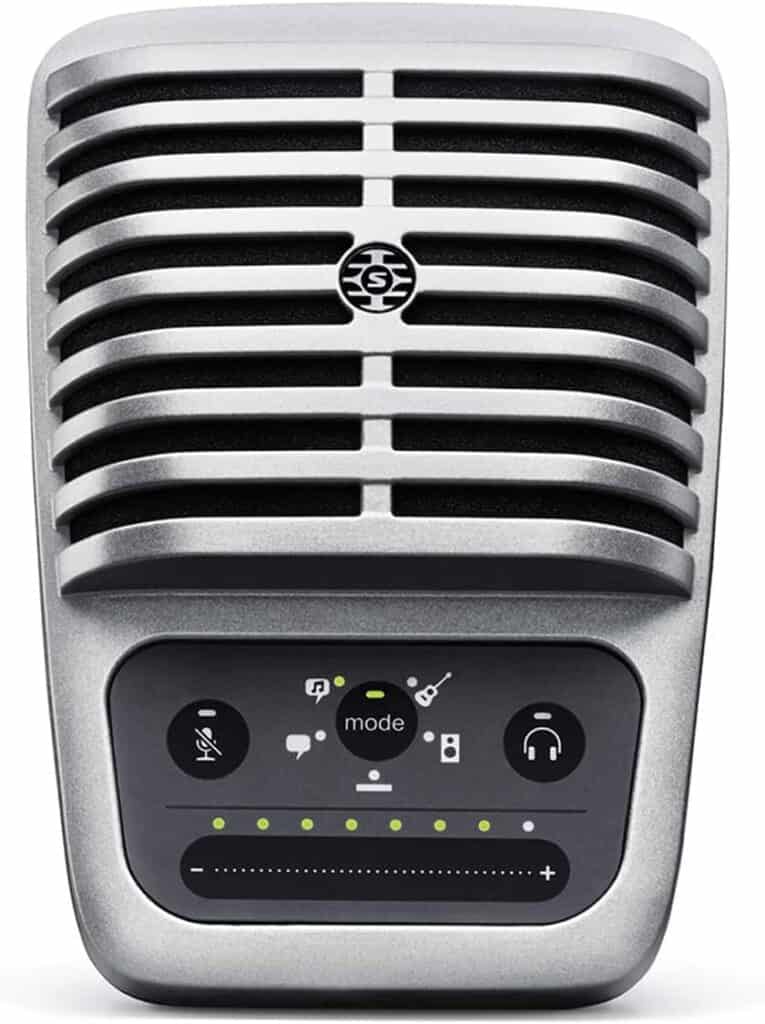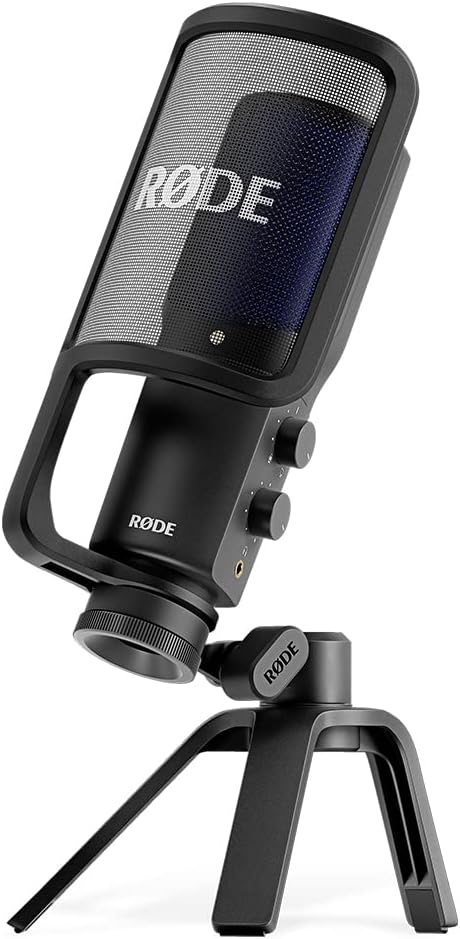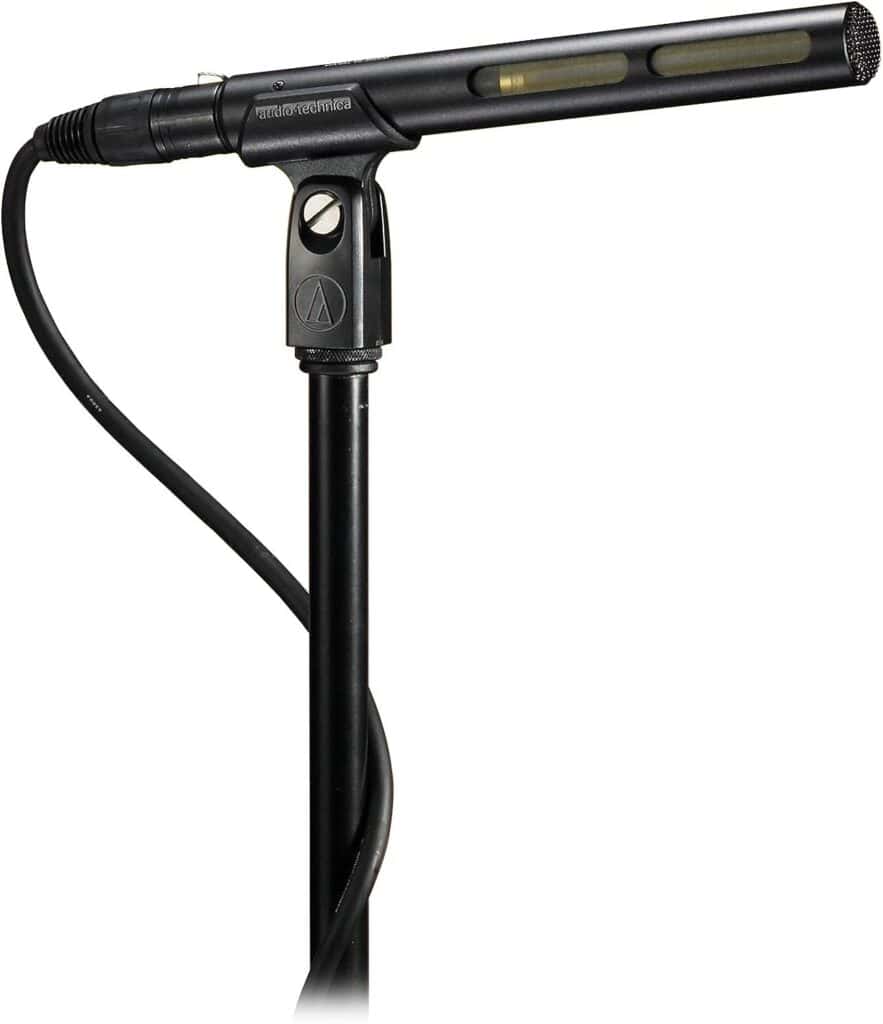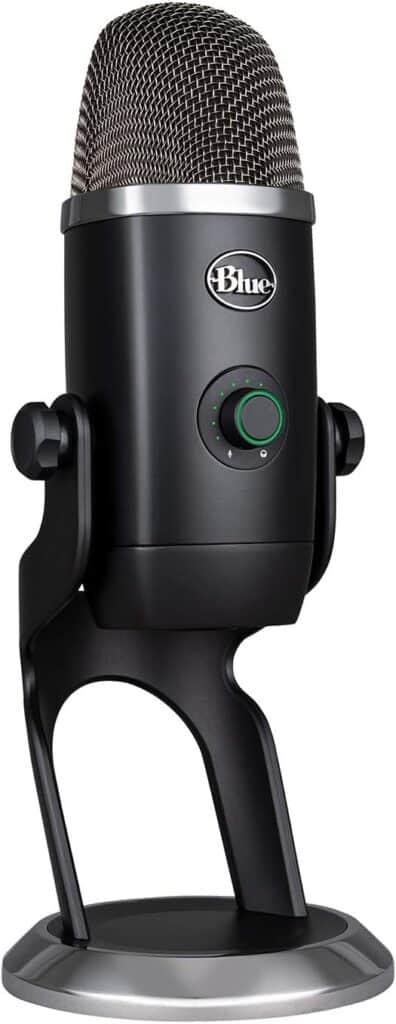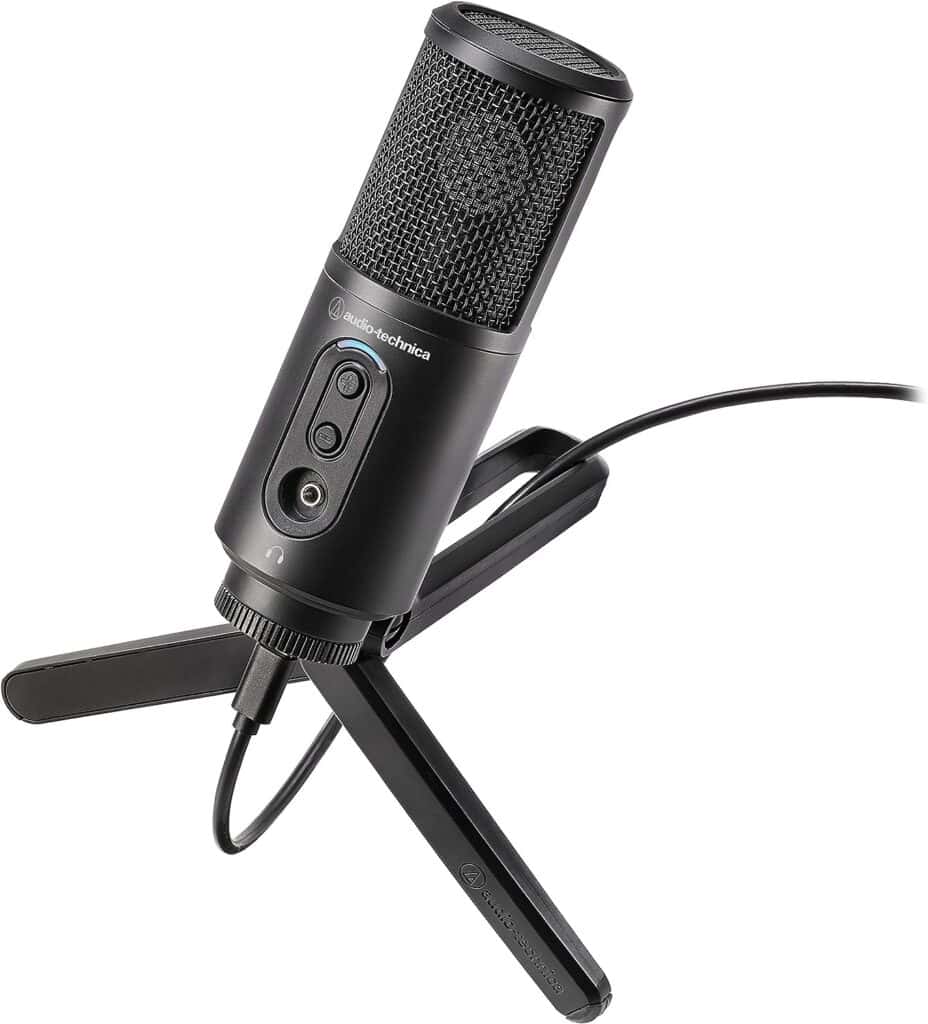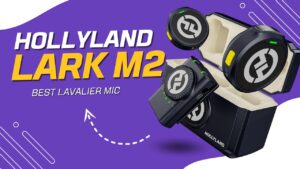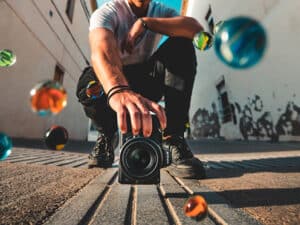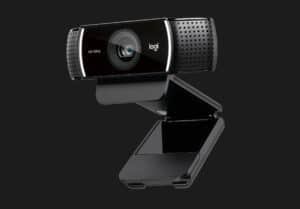If you want the absolute best sound for your audience, a condenser mic should be a part of your podcast setup. They require some careful use, but the sound quality is remarkable. In this article, we offer our list of the best condenser mics for podcasting to help you produce clear and engaging recordings.
Castos is a participant in the Amazon Services LLC Associates Program. We may earn commissions from your purchases on Amazon.com, though at no cost to you.
What is a Condenser Mic?
Before we dive into our recommendations for the best condenser mics for podcasting, it’s important to understand what a condenser mic is and how it works.
Condenser microphones use an electrically charged diaphragm and a backplate to create a capacitor that captures sound waves. (They are also known as capacitor microphones.) This design allows them to be highly sensitive and responsive to subtle nuances in sound.
This is different from dynamic mics that use electromagnetic induction to convert sound waves into electrical signals. These have a coil of wire attached to the diaphragm that moves within a magnetic field, generating an electrical signal.
Condenser microphones are known for their sensitivity, accuracy, and ability to capture a wide range of frequencies, making them popular choices for studio recording, podcasting, voiceovers, and capturing detailed sound sources like acoustic instruments. As such, they are best used in controlled environments without background noise.
Most condenser microphones require phantom power (typically 48 volts) to charge the capacitor and operate. This power is usually supplied by a mixer or audio interface.
Condenser microphones are generally more expensive than dynamic microphones due to their complex design and higher sensitivity. They are more delicate and sensitive to physical shock and moisture than dynamic mics.
Tip
Looking for the right podcast gear for your show? Check out our complete podcast equipment guide for more recommendations.
The 13 Best Condenser Mics for Podcasting
Now that you understand how they work, let’s dive into our list of the best condenser mics for podcasting.
1. Neumann TLM102
The Neumann TLM 102 is an ideal choice for podcasting due to its superb audio quality and compact design. With its large diaphragm condenser, it captures your voice with remarkable clarity, ensuring your podcast sounds professional and engaging.
The TLM102’s cardioid pickup pattern minimizes background noise, focusing solely on your voice. This means you can record in various environments without worrying about unwanted distractions. The wide frequency response captures the full richness of your voice, from deep lows to crisp highs, enhancing your podcast’s overall sound quality. Plus, its sleek and durable build ensures longevity and ease of use.
2. Shure Beta 87A
The Shure Beta 87A is an excellent choice for podcasting because it delivers outstanding audio clarity and precision, ensuring your voice sounds crisp and professional on your podcast recordings.
The supercardioid pickup pattern reduces ambient noise and captures your voice directly in front of the microphone, making it ideal for recording in less-than-perfect environments. Its robust build quality ensures durability.
Additionally, the Beta 87A’s extended frequency response accurately reproduces your voice’s nuances, from warm lows to crystal-clear highs, making your podcast content engaging and enjoyable for your listeners.
3. Rode NT-1 Kit
The Rode NT-1 Kit is an excellent choice for podcasting, offering superb audio quality and versatility. Its large diaphragm condenser mic captures your voice with exceptional clarity and detail. With its low self-noise and wide dynamic range, it minimizes unwanted background noise and captures every nuance of your voice.
The included shock mount and pop filter enhance recording quality by reducing vibrations and plosive sounds. Its cardioid pickup pattern focuses on your voice, minimizing room noise and distractions.
The NT-1 Kit also comes with an audio interface and headphones, making it a complete podcasting solution. Its durable build ensures long-lasting performance, making it a dependable choice for your podcasting needs.
4. Lewitt LCT 940
The Lewitt LCT 940 is one of the best condenser mics for podcasting. Its dual-diaphragm design allows you to switch between pure tube and FET circuitry, giving you a wide range of tonal options to suit your podcasting style.
The LCT 940 microphone captures your voice with remarkable clarity and warmth, ensuring a professional and captivating podcast. With its selectable polar patterns, including cardioid, omni, and figure-eight, you can adapt to different recording scenarios and collaborate with ease.
The LCT 940 also features a low-cut filter and attenuation pad for added flexibility. Its robust construction ensures durability, making it a reliable choice for your podcasting endeavors.
5. Neumann KM 184
The Neumann KM 184 is perfect for podcasting due to its compact size and exceptional audio quality. Its small diaphragm condenser design is ideal for capturing your voice with remarkable precision and naturalness.
Despite its diminutive form, it delivers a rich and detailed sound. With a cardioid polar pattern, it effectively isolates your voice while minimizing background noise, making it suitable for various recording environments.
The KM 184’s transparent and uncolored sound reproduction enhances the authenticity of your podcast content. Its durable build and reputation for reliability make it a valuable investment for podcasters seeking pristine audio quality.
6. Shure PGA27-LC
The Shure PGA27-LC is one of the best condenser mics for podcasting. Its large-diaphragm condenser design offers studio-quality audio capture, ensuring your podcast sounds clear and professional. With a cardioid polar pattern, it effectively focuses on your voice while reducing background noise and room reflections, guaranteeing a clean recording.
The PGA27-LC also handles a wide frequency range, capturing the richness of your voice from lows to highs. Its rugged build and durable construction mean it can withstand the demands of regular podcasting use. Its affordability makes it a budget-friendly option without sacrificing audio quality.
7. Shure MV51 Digital
The Shure MV51 Digital microphone is a sleek and modern design that not only looks good on your desk but also delivers exceptional audio quality. With its digital USB and Lightning connectivity options, you can seamlessly connect to your computer or iOS devices, offering flexibility for various podcasting setups.
The large-diaphragm condenser captures your voice with clarity and warmth. Its built-in touch panel allows for quick adjustments, and the headphone monitoring ensures real-time audio control.
Whether you’re recording solo episodes or interviews on the go, the MV51’s portability, versatility, and Shure’s renowned audio engineering make it an excellent choice for podcasters seeking top-notch sound quality with ease of use.
8. Rode NT-USB
The Rode NT-USB offers simplicity and quality in one sleek package. Its plug-and-play USB connectivity means you can start recording your podcast instantly, without the hassle of complex setups, which is what makes it one of the best condenser mics for podcasting.
This condenser microphone captures your voice with impressive clarity and warmth. Its cardioid pickup pattern minimizes background noise, allowing your voice to shine.
The NT-USB also features a headphone jack for real-time monitoring and volume control, ensuring you get the perfect audio balance during your recording. Its affordability and compact design make it accessible and portable for podcasters of all levels.
Whether you’re just starting a podcast or need a reliable backup mic, the Rode NT-USB delivers excellent audio quality for your podcasting needs.
9. Slate Digital VMS ML-1
The Slate Digital VMS ML-1 offers unparalleled studio-quality audio in a versatile package. Its precision-modeled condenser design faithfully captures your voice with unmatched detail.
With a choice of classic emulations of famous microphones, you can tailor your voice to suit your podcast’s unique tone and style. The ML-1’s wide frequency response captures every nuance of your voice, from deep lows to sparkling highs, providing depth and richness to your content.
Whether you prefer a vintage vibe or modern clarity, this microphone can deliver. Its reliability and compatibility with the Slate Digital ecosystem make it one of the best condenser mics for podcasting.
10. Audio-Technica AT875R
The Audio-Technica AT875R is a compact and high-performance solution, which is why it’s one of the best condenser mics for podcasting. This shotgun condenser design excels at capturing your voice with crystal-clear precision while minimizing background noise and room reflections, making it ideal for podcasting in challenging acoustic environments.
With its shorter length, it’s unobtrusive and easy to position allows for versatile recording setups. The AT875R boasts a wide frequency response, ensuring your podcast sounds rich and professional, capturing everything from subtle nuances to dynamic vocal expressions.
The AT875R is rugged and guarantees durability, and it’s powered by standard 48V phantom power, making it compatible with a wide range of audio interfaces.
11. Blue Yeti Pro
The Blue Yeti Pro is a versatile USB/XLR mic that allows you to easily switch between a direct USB connection for simplicity or XLR for professional-grade studio setups. This flexibility makes it suitable for podcasters at any level.
The tri-capsule array delivers exceptional audio quality, capturing your voice with remarkable clarity and depth. Its multiple polar patterns – cardioid, bidirectional, omnidirectional, and stereo – adapt to various recording situations, offering versatility for interviews, solo episodes, or group discussions.
With built-in headphone monitoring and volume control, you can ensure perfect audio in real-time. The Yeti Pro’s solid construction and iconic design make it a reliable and stylish choice for all your podcasting needs.
12. Audio-Technica AT2020
The Audio-Technica AT2020 is a side-address condenser design that captures your voice with pristine clarity and warmth, ensuring that your podcast sounds crystal clear.
The cardioid polar pattern effectively isolates your voice while reducing unwanted background noise, making it perfect for home or studio recording environments. Its wide frequency response captures the nuances of your voice, from rich lows to crisp highs, adding depth and authenticity to your podcast content.
With its durable build and affordability, the AT2020 is a dependable choice for both beginners and experienced podcasters.
13. Audio Technica ATR2500-USB
The Audio-Technica ATR2500 is a solid choice for podcasting. This USB condenser microphone offers simplicity and quality in one package. Its plug-and-play functionality means you can start recording your podcast right away without the need for complex setups or additional gear.
The ATR2500 captures your voice with clarity and accuracy, making your podcast sound clear and professional. Its cardioid pickup pattern minimizes background noise, ensuring that your voice takes center stage.
Additionally, its affordable price point makes it an accessible option for podcasters on a budget. Whether you’re a beginner or a seasoned podcaster, the Audio-Technica ATR2500 offers reliability and quality, making it a smart choice for your podcasting journey.
Why Use a Condenser Mic for Podcasting?
Podcasters may choose to use a condenser microphone for several reasons, depending on their specific needs and recording environment. Here are some of the advantages of using a condenser microphone for podcasting:
High-Quality Audio
Condenser microphones are known for their ability to capture audio with exceptional clarity and detail. This is crucial for podcasters who want to produce professional-sounding content with clear voices and a full frequency range.
Sensitivity
Condenser microphones are more sensitive than dynamic microphones, which means they can pick up subtle nuances in the speaker’s voice. This sensitivity is especially beneficial for podcasters who want to capture vocal inflections, soft-spoken moments, or the richness of musical elements in their podcasts.
Wide Frequency Response
Condenser microphones typically have a broader frequency response compared to dynamic microphones, allowing them to capture a wider range of frequencies accurately. This can be important for capturing the full spectrum of voices and sound effects in a podcast.
Versatility
Many condenser microphones offer selectable polar patterns, such as cardioid, omnidirectional, or figure-eight. This versatility allows podcasters to choose the pickup pattern that best suits their recording environment and reduces unwanted background noise or interference.
Studio Use
Podcasters working in controlled studio environments with minimal background noise can benefit from the sensitivity and accuracy of condenser microphones. These mics are well-suited for studio recording where the conditions can be optimized for audio quality.
Post-Processing
Condenser microphones often produce audio recordings that are easier to manipulate and enhance during post-production. This is important for podcasters who may want to edit, mix, or apply various audio effects to their recordings.
Sound Quality Consistency
Condenser microphones tend to maintain their sound quality consistently over time, assuming they are well-maintained. This reliability is crucial for podcasters who want to ensure a consistent audio experience for their audience.
Is a Condenser Mic for Podcasting Right For You?
It’s worth noting that while condenser microphones offer many advantages for podcasters, they may also have some drawbacks, such as being more sensitive to background noise and requiring phantom power from an audio interface or mixer.
Therefore, the choice of microphone should consider the specific recording environment and the podcaster’s goals for audio quality. Ultimately, the choice between a condenser microphone and a dynamic microphone for podcasting depends on the individual’s preferences and needs.
That’s it for our list of the best condenser mics for podcasting. Which mic do you use for yor show? Let us know in the comments.
